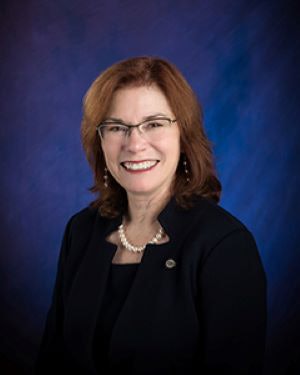Hundreds of higher education leaders and members of Congress convened virtually on Tuesday to discuss legislative priorities for Hispanic-serving institutions (HSIs) as part of the Hispanic Association of Colleges and Universities’ (HACU) 26th National Capitol Forum.
Educating more than 6.5 million students, HSIs are becoming the “backbone of workforce development and prosperity for the nation,” said Dr. Antonio R. Flores, president and chief executive officer of HACU.
 Dr. Garnett S. Stokes
Dr. Garnett S. StokesSimilar to most other institutions within the higher education sector however, HSIs continue to face the equity, enrollment and financial challenges generated by the COVID-19 pandemic.
The transition to online learning created many barriers for students—especially in rural areas—who were unable to access technology resources. To address these gaps, the City University of New York (CUNY), for example, purchased 30,000 new laptops and tablets and over 4,000 Wi-Fi hotspots.
Additionally, the educational disruption led many prospective and current students to take time off from their degrees.
“I sat in on student classes throughout fall semester,” said Dr. Garnett S. Stokes, president of the University of New Mexico (UNM). “Went and visited these remote classes. Joined Zoom meetings. For our students, this was just not the same experiences. Even those living in residence halls. The campus experience was so different.”
UNM’s second semester retention rate dropped by 10%, she reported. The school’s efforts have now recently shifted to encouraging students to return. Through a series of campaigns, UNM highlighted its potential return to in-person classes plan as well as broadcasted available financial aid and academic advising services.
To adapt to learning changes, grading policies were reevaluated and classrooms began offering more flexibility. SAT and ACT testing also became optional at many colleges and universities.
However, the lack of in-person events and students on campus created revenue losses as athletic departments were unable to compete and many institutions made the decision to refund spring 2020 housing and meal plans.
To mitigate those profit losses, institutions used designated Coronavirus Aid, Relief, and Economic Security (CARES) Act funding to retain employees, cover deficits and provide students with aid.
However, Deferred Action for Childhood Arrivals (DACA) students and non-U.S. citizens were not eligible to receive funding.
“We have a significant amount of DACA and undocumented students who have great needs,” said Dr. Rebecca Stoltzfus, president of Goshen College. “Out of principle, we decided that they would be treated equally and we just bore that cost on our operating budget. This was based on our commitments to equity in our student body and social justice.”
 Dr. Rebecca Stoltzfus
Dr. Rebecca StoltzfusAt CUNY, the Chancellor Emergency Fund raised over $8 million to allocate $500 in emergency grants to thousands of students.
To support institutions, businesses and individuals, the Supplemental Appropriations Bill and the American Rescue Plan also offered financial assistance.
Hector Batista, executive vice chancellor and chief operating officer at CUNY, advocated to policymakers around the inclusion of DACA and undocumented students in federal emergency relief funds.
“We have continued to be very grateful of some of the federal emergency grants that we have received,” he said. “At the forefront of everything we do is to make sure students complete their degrees and our families in low-income neighborhoods have the resources to deal with this pandemic.”
Stoltzfus also emphasized the need to increase Pell-grant funding. At Goshen, 40% of students are Pell-eligible.
Despite the challenges brought on by the pandemic, there have also been “silver linings.” For example, there is now a national focus on equity gaps and broadband as an “infrastructure need,” awareness around the importance of student services, and conversations around work-life balance,” according to Stokes.
“I hope what people take away from this is just how much care higher education leaders have shown in thinking through the needs of our communities, our students, our staff and faculty,” she said. “And really how thoughtful our actions have been in the face of so much uncertainty.”
Beyond COVID-19 relief needs, Flores laid out HACU’s four main Congressional priorities including:
- Increased funding for HSIs.
- Support for a $10 million loan program to cover capital investments at HSIs.
- The passage of the Hispanic Educational Resources and Empowerment (HERE) Act to increase collaboration between HSIs and Hispanic-serving K-12 school districts.
- The passage of the Development, Relief and Education for Alien Minors (DREAM) Act.
“Congress and this new administration are increasingly recognizing the importance of HSIs and Hispanics in the recovery of the country,” he said.
In a later session, U.S. Secretary of Education Dr. Miguel Cardona provided remarks about the Department of Education’s upcoming priorities related to HSIs.
Sarah Wood can be reached at [email protected].


















